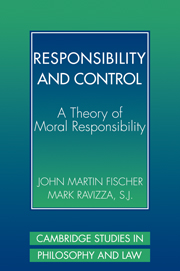Book contents
- Frontmatter
- Contents
- Acknowledgments
- 1 Moral Responsibility: The Concept and the Challenges
- 2 Moral Responsibility for Actions: Weak Reasons-Responsiveness
- 3 Moral Responsibility for Actions: Moderate Reasons-Responsiveness
- 4 Responsibility for Consequences
- 5 Responsibility for Omissions
- 6 The Direct Argument for Incompatibilism
- 7 Responsibility and History
- 8 Taking Responsibility
- 9 Conclusion
- Bibliography
- Index
1 - Moral Responsibility: The Concept and the Challenges
Published online by Cambridge University Press: 05 June 2012
- Frontmatter
- Contents
- Acknowledgments
- 1 Moral Responsibility: The Concept and the Challenges
- 2 Moral Responsibility for Actions: Weak Reasons-Responsiveness
- 3 Moral Responsibility for Actions: Moderate Reasons-Responsiveness
- 4 Responsibility for Consequences
- 5 Responsibility for Omissions
- 6 The Direct Argument for Incompatibilism
- 7 Responsibility and History
- 8 Taking Responsibility
- 9 Conclusion
- Bibliography
- Index
Summary
MORAL RESPONSIBILITY: WHAT'S AT ISSUE?
An important difference between persons and other creatures is that only persons can be morally responsible for what they do. When we accept that someone is a morally responsible agent, this typically involves more than holding a particular belief about him; it entails a willingness to adopt certain attitudes toward that person and to behave toward him in certain kinds of ways. Imagine, for example, that you return home one evening and find your treasured Waterford vase shattered on the dining room floor. Discovering that the vase has been purposely shattered by a malicious houseguest will give rise to a set of reactions much different than those which would seem appropriate were you to discover that the vase had been accidentally toppled from the shelf by your clumsy cat. In the latter case, you might feel regret and perhaps even anger at your cat, but you would hardly feel the same sort of resentment and moral indignation that would seem warranted had your guest intentionally broken the vase in order to hurt you. Moreover, it would be appropriate to blame your guest and to hold him responsible for the misdeed in a way much different from the way in which you might discipline your cat and try to train him not to climb on the furniture in the future.
- Type
- Chapter
- Information
- Responsibility and ControlA Theory of Moral Responsibility, pp. 1 - 27Publisher: Cambridge University PressPrint publication year: 1998



